Protests and possibilities: West Asia and India
This paper analyses West Asian politics in the wake of the Arab uprisings, and examines the nature and implications of India's policies towards the countries
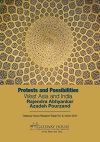 Courtesy: Gateway House
Courtesy: Gateway House
This paper analyses West Asian politics in the wake of the Arab uprisings, and examines the nature and implications of India's policies towards the countries
 Courtesy: jappalang/WikimediaCommons
Courtesy: jappalang/WikimediaCommons
In recent years, there has been a growing interest in Gandhian philosophy and values among Chinese citizens. Can the Mahatma’s philosophy of non-violence, social harmony, and environmental protection be applied to address issues facing present-day China?
 Courtesy: Furmeyer/WikimediaCommons
Courtesy: Furmeyer/WikimediaCommons
Maritime piracy is one of the several grave security issues faced by today’s world. This problem, however, isn’t a new phenomenon, and nations have long-battled this issue. How did piracy manifest itself in the Indian Ocean in the 19th century, and what was the nature of counter-piracy efforts during that period?
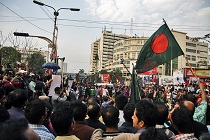 Courtesy: Rajiv Ashrafi/Flickr
Courtesy: Rajiv Ashrafi/Flickr
The youth of Bangladesh, a generation born well after 1971, are now demanding long overdue accountability, secularism, and neighbourly friendship. If the movement is successful, Bangladesh will have shown all South Asian countries that to transcend the past it is necessary to be transparent and secular.
 Courtesy: Pete Souza/The White House
Courtesy: Pete Souza/The White House
The announcement of the Pacific pivot by the U.S. in 2001 has led to several nations making bold political moves. However, the U.S. isn’t yet ready to be a regional protector against China. What does Washington have to do to prepare itself for the Pivot?
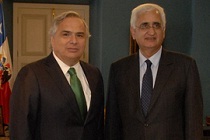 Courtesy: Ministry Of External Affairs, India
Courtesy: Ministry Of External Affairs, India
Indian Foreign Minister Salman Khurshid’s February 5 visit to Chile and Argentina is emblematic of the new era in Indo-Latin America relations. What does this increased engagement mean for India and Chile, two rapidly growing economies of the Global South?
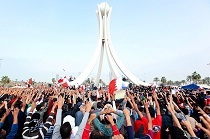 Courtesy:
Courtesy:
The Arab uprisings show no sign of closure, and have become amorphous. While New Delhi has so far been immunised from the political and religious dimensions of the uprisings, the rise of political Islam, Islamic governance, and continuing instability will impact India.
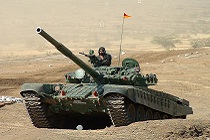 Courtesy: Chanakyathegreat/WikimediaCommons
Courtesy: Chanakyathegreat/WikimediaCommons
After each terror attack in india, there are strident demands for military action against Pakistan. ‘Surgical’ strikes and limited war in a bilateral nuclear age are not really options. What is needed is more decisive action on non-military fronts
 Courtesy:
Courtesy:
India’s relations with Islamic nations, many of which are members of the Organisation of Islamic Cooperation (OIC), have become even more prolific over the last decade. While India does not visualise becoming a member of a religious international body, many reasons militate against our formally joining the OIC.

Lt. Gen. Prakash Menon and Prof. Gautam Sen delivered the keynote address at the two-day National Seminar on Non-Alignment 2.0 organised by the Department of Civics and Politics in the University of Mumbai. Gateway House’s Aakash Brahmachari blogs about the seminar, and India’s strategic rivals.